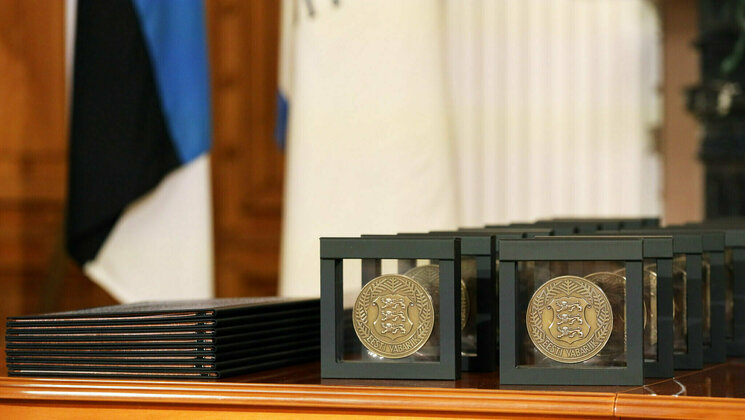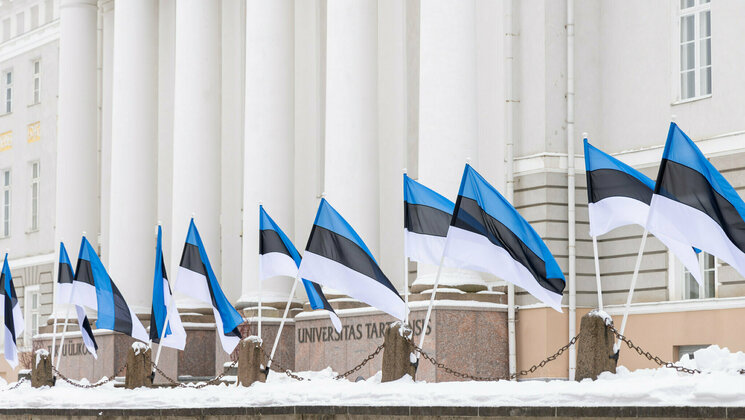The Institute of Psychology recognized its best of the year 2023/2024

At the graduation ceremony held on June 15, the Institute of Psychology of the University of Tartu recognized its best of the past year - outstanding master's theses and bachelor's research papers, the institute's most valued courses, the best scientific publications and the Institute's Acts of the Year in the eyes of both students and employees.
Best master's theses of the year 2022/23
Johanna Hark
“Validating the Scale for the Assessment of Negative Symptoms (SANS) and Scale for the Assessment of Positive Symptoms (SAPS) in a sample of patients with schizophrenia spectrum disorders”
Supervisors: Kätlin Anni, Liina Haring
Keiti Liivas
“Associations between bipolar disorder polygenic risk scores and bipolar disorder in patients with first major depressive disorder episode”
Supervisor: Kelli Lehto
Best bachelor’s research papers of the year 2022/23
Timo Siimon
“Exploring the subjective effects of a simulated psychedelic experience on creativity”
Supervisor: Jaan Aru
Eva Margareeta Kört
“Associations between the symptomatology of eating disorders and the personality traits of internalizing/externalizing spectrum”
Supervisors: Kirsti Akkermann, Helo Liis Soodla
Annika Jõemägi
“Effects of negative emotion on attentional breadth”
Supervisors: Martin Kolnes, Andero Uusberg
Marianne Hanson
“Sex-related neurochemical differences in rats’ exploratory behaviour”
Supervisor: Margus Kanarik
Mireena Mandel
“The relationship between personality and coronavirus responses: a comparison between the predictive ability of domains, facets and nuances”
Supervisor: Kadri Arumäe
Alisa Andros
“Creativity mindset, creativity and informing about the nature of creativity as a tool to increase growth creativity mindset”
Supervisor: Jaan Aru
Irmeli Kokmann
“Conflicts between three-year-olds and their parents”
Supervisors: Jane Kuperjanov, Tiia Tulviste
Marilis Lauk
“Gender differences in the diagnosis of attention deficit hyperactivity disorder, level of education and genetic predisposition”
Supervisors: Elis Haan, Kelli Lehto
Anastasia Perk
“Adaption of Estonian Sensory Reactivity Scale SR-AS”
Supervisors: Kirsti Akkermann, Silja Kuusik
Liisa Johanna Pärnamägi
“Measuring BDSM role identities: Validation of BDSM role identity inventory”
Supervisor: Annika Tamme
Elina Kahre
“Relationships between the use of antidepressants or gene variants relevant in antidepressants metabolism with electroconvulsive therapy among individuals with depression based on Estonian Biobank”
Supervisors: Kelli Lehto, Kristi Krebs
Best courses of 2022
The evaluation of the best courses was based on the results of the feedback survey of the Study Information System. Courses with at least 12 participants were taken into account. Three courses had the maximum possible average rating!
Methods of Individual Assessment in School Psychology
The course provides an overview of the application of the principles of individual assessment in the context of an educational institution. Students value the practical output of the course and the student-friendly and considerate lecturer.
Counselling Skills' Training
The course focuses on training the management of the counseling process and counseling skills. Students value the lecturer's extremely useful knowledge and openness to making mistakes as part of the learning process.
Training of Communication Skills
The course deals with the most basic communication skills known in communication psychology and the applications of these skills. Students praise the practical value of the subject and the relevant study materials and assignments.
Best publications of 2022
In 2022, the Institute of Psychology published a total of 51 works in the world's leading journals (and anthologies). All the professors of the institute were the evaluators of the best article. As there were many outstanding works, no consensus was reached on a single best publication, and three works were chosen that deserve to be highlighted.
„Large-scale distributed networks and cerebral hemispheres“ in Cortex
Elkhonon Goldberg, Jaan Tulviste
Together with A. R. Luria's best student Elkhanon Goldberg, Jaan Tulviste analyzes how two large brain networks - executive and default - are related to the lateralization of functions. This work is an important contribution to the development of the ideas of the Luria school of thought.
„Taking risks to feel excitement: Detailed personality profile and genetic associations“ in European Journal of Personality
Liisi Ausmees, Maie Talts, Jüri Allik, Uku Vainik, Timo T. Sikka, Tiit Nikopensius, Tõnu Esko, Anu Realo
The genetics and personality of a very unique sample - 298 parachuters were studied, which happened thanks to the participation of one of Estonia's most experienced parachutists, Maie Talts. In cooperation with the Estonian Biobank, it was possible to find out the genetic and personality factors of risk-taking behavior. This award is also a recognition of the first author Liisi Ausmees, who in 2022 was a co-author of seven high-level publications.
„The interplay between binge eating risk factors: Toward an integrated model“ in Journal of Health Psychology
Katrin Kukk, Kirsti Akkermann
Using the extract of experience method, it was determined how a neurotic disposition and negative emotions together lead to uncontrolled overeating.
The Act of the Year 2022/23 in the eyes of the students
The project „Ubinad koos, ubinad hoos!“
"Ubinad kaos, ubinad hoos!" is a project written by psychology students and alumni of the University of Tartu, which is financed by the European Solidarity Corps. Within the framework of the project, a number of different events will take place during the year 2023, the aim of which is to create a sense of unity among students studying psychology, lecturers, alumni and practitioners through joint activities, discussions and get-togethers.
The Act of the Year 2022/23 in the eyes of the employees
Näituse newsletter
The Institute of Psychology did not have a regular employee newsletter until the fall of 2022, when Kertu Saar, our communications manager, started writing the weekly Näituse newsletter, which was named after the address of our building (Näituse 2). It soon became apparent that there is no shortage of topics and the weekly newsletter is a very good place to summarize all the happenings, activities that require input, birthdays, newly published scientific articles, etc.





